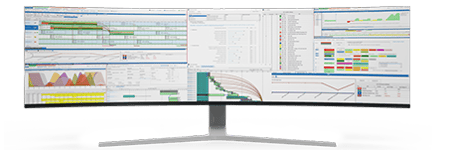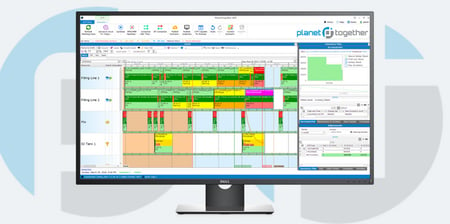Advancing Purchasing Forecasting in Medical Manufacturing
As a Purchasing Manager, the need for an accurate and proactive approach to forecasting is essential to meet production demands, optimize inventory, and keep costs in check. But achieving this level of accuracy and foresight is challenging, particularly with fluctuating market conditions, regulatory requirements, and supply chain complexities.
This is where advanced tools, such as PlanetTogether integrated with ERP systems like SAP, Oracle, Microsoft Dynamics, Kinaxis, and Aveva, can make a substantial difference. By creating a seamless data ecosystem, these integrations empower purchasing teams with real-time visibility, automation, and analytics to make smarter, faster, and more accurate purchasing decisions.
In this blog, we will explore how an integrated system with PlanetTogether and a robust ERP solution can elevate purchasing forecasting, focusing on strategies that specifically benefit medical manufacturing.

The Unique Demands of Medical Manufacturing
Medical manufacturing presents a unique set of challenges in the realm of purchasing:
Strict regulatory standards demand that materials and components meet exacting quality specifications, often leading to a more limited pool of approved suppliers.
Inventory volatility is high due to unpredictable demand for certain medical devices or supplies, often influenced by external factors like public health needs.
High inventory costs for raw materials and components make it imperative to forecast accurately to avoid excess stock or shortages.
Long lead times for certain critical parts and materials further complicate purchasing planning.
To tackle these challenges, a sophisticated purchasing forecasting approach is required—one that considers various factors, such as lead time, supplier capacity, demand volatility, and material availability. This is where an integration of PlanetTogether with an ERP solution like SAP, Oracle, Microsoft Dynamics, Kinaxis, or Aveva can transform operations.
![]()

Integrated Systems for Purchasing Forecasting
An integration between PlanetTogether and an ERP system enhances data flow between departments, consolidates insights, and creates a cohesive workflow from production planning to purchasing. This integration supports more robust purchasing forecasts by allowing purchasing managers to:
Access real-time demand data from production schedules and customer orders.
Monitor inventory in real time, reducing risks of overstocking or stockouts.
Optimize supplier management by evaluating supplier performance, delivery timelines, and quality consistency.
Through these capabilities, an integrated PlanetTogether and ERP system can provide critical forecasting tools that align closely with real-world production needs.
Data Flow and Synchronization
With PlanetTogether and ERP integration, purchasing managers benefit from synchronized data that enables a single source of truth. Production forecasts, inventory levels, and supplier statuses are available in real time, ensuring that purchasing is aligned with production demand. For example:
Inventory Levels: PlanetTogether’s inventory data flows directly into the ERP system, allowing the purchasing team to view precise stock levels. This integration minimizes the risks of over-purchasing or under-purchasing, as real-time data enables better-informed decision-making.
Lead Time Calculations: ERP systems often contain detailed lead time data for each supplier, and this information can be leveraged within PlanetTogether’s scheduling software to forecast purchasing timelines accurately. This helps purchasing managers set more accurate reorder points and reduce delays in procurement.
Demand Patterns: Demand forecast data from the ERP flows directly into PlanetTogether, allowing purchasing managers to anticipate fluctuations and adapt their purchasing strategy accordingly.

How PlanetTogether + ERP Drives Accurate Purchasing Forecasting
Purchasing forecasting involves anticipating demand for materials and components to ensure that production continues smoothly without incurring excess costs. By using PlanetTogether alongside an ERP solution, purchasing managers can achieve a higher degree of accuracy in forecasting:
Real-Time Demand Sensing and Adjustment
Through integration, PlanetTogether’s advanced scheduling and planning tools work in tandem with ERP data to capture real-time demand signals. This enables the purchasing team to:
Adjust purchasing orders to match fluctuations in production schedules.
Identify material shortages early and trigger orders to avoid disruptions.
Balance inventory levels across multiple manufacturing sites for global operations.
The integration also allows for rapid adjustments. For example, if a particular product demand spikes unexpectedly, PlanetTogether’s integration with SAP or Oracle can automatically signal the purchasing team, allowing them to secure additional materials without delay.
Automation of Replenishment and Ordering
With an integrated setup, automation plays a significant role in refining purchasing forecasting. When stock levels hit a predefined threshold, the ERP-PlanetTogether integration can automatically initiate a replenishment order. This process minimizes manual intervention, reduces errors, and ensures a steady flow of materials without interruptions in production.
For instance, Aveva’s ERP platform, known for its advanced analytics capabilities, can integrate with PlanetTogether to automatically generate purchasing forecasts based on historical data and current demand trends. As a result, purchasing managers can reduce the likelihood of human error and focus more on strategic decision-making.
Supplier Performance and Lead Time Monitoring
Supplier reliability directly affects purchasing forecasting. By integrating PlanetTogether with an ERP system like Microsoft Dynamics, purchasing managers can track supplier performance metrics such as lead time accuracy, order fulfillment rates, and quality scores. This data allows them to forecast purchasing needs with a more realistic perspective of supplier behavior.
Moreover, lead time data from the ERP system can be factored into PlanetTogether’s scheduling algorithms, enabling the purchasing team to better predict delivery timelines and make adjustments as needed. This ensures that purchasing forecasts are both accurate and achievable based on supplier performance.
Scenario Planning and "What-If" Analysis
Predicting demand in the medical manufacturing industry often involves anticipating scenarios like sudden surges in demand for specific products. With PlanetTogether’s scenario planning and “what-if” analysis tools, purchasing managers can simulate various demand scenarios and understand their potential impact on material needs and costs.
For example, by integrating PlanetTogether with Kinaxis’ robust supply chain planning features, purchasing managers can model the effects of a sudden increase in demand for medical devices or PPE. This allows them to prepare more effectively, adjusting purchasing plans in advance to mitigate risks and maintain adequate inventory levels.

Benefits of Enhanced Forecasting for Purchasing Managers in Medical Manufacturing
By leveraging an integrated system with PlanetTogether and ERP, purchasing managers can unlock several benefits that directly impact the bottom line:
Cost Savings Through Optimized Inventory Management
A more accurate purchasing forecast minimizes excess inventory, reducing storage and holding costs. At the same time, it helps avoid shortages that could disrupt production, potentially leading to costly delays.
Increased Supplier Reliability and Performance
Integrated systems allow for a more data-driven approach to supplier management, which ultimately improves supplier relationships. By setting clear performance metrics and having real-time access to lead times, purchasing managers can hold suppliers accountable and foster partnerships based on transparency and performance.
Improved Decision-Making with Real-Time Data
Real-time access to data enhances purchasing managers' ability to make informed decisions quickly. With the support of ERP systems like Oracle or SAP, purchasing managers gain comprehensive visibility into all aspects of production and procurement, reducing guesswork in forecasting.
Strategic Focus and Value-Added Initiatives
By automating routine tasks, such as reorder points and supplier performance monitoring, purchasing managers can focus on more strategic initiatives. This might include exploring new supplier relationships, conducting cost-benefit analyses, or investigating sustainable sourcing options to enhance operational resilience and sustainability.
Best Practices for Maximizing Purchasing Forecasting with Integrated Systems
To make the most of an integrated system, consider implementing the following best practices:
Collaborate with cross-functional teams to align purchasing forecasts with broader production and sales goals.
Regularly review supplier performance data within the ERP system and adjust reorder points and safety stock levels accordingly.
Leverage “what-if” scenario planning in PlanetTogether to prepare for demand spikes or supply disruptions.
Use historical data from both PlanetTogether and ERP to continuously improve forecasting models, refining accuracy over time.
Invest in training for purchasing teams to ensure they are equipped to use advanced forecasting tools and understand the data available in the integrated system.
For Purchasing Managers in medical manufacturing, integrating PlanetTogether with ERP systems like SAP, Oracle, Microsoft, Kinaxis, or Aveva opens up new possibilities for optimizing purchasing forecasting. This integration allows for a data-driven, automated, and agile approach to procurement, enabling purchasing teams to meet the challenges of the medical manufacturing sector with greater accuracy and confidence.
In a world where demand patterns and regulatory environments continue to evolve, having a reliable and adaptive purchasing forecasting system is essential. By investing in integrated planning solutions, medical manufacturers can ensure they are not only meeting today's demands but are also prepared for the challenges of tomorrow.
Are you ready to take your manufacturing operations to the next level? Contact us today to learn more about how PlanetTogether can help you achieve your goals and drive success in your industry.
Topics: PlanetTogether Software, Integrating PlanetTogether, Scenario Planning and What-if Analysis, Medical Manufacturing, Data Flow and Synchronization, Real-Time Demand Sensing and Adjustment, Automation of Replenishment and Ordering, Supplier Performance and Lead Time Monitoring, Increased Supplier Reliability and Performance, Improved Decision-Making with Real-Time Data, Strategic Focus and Value-Added Initiatives




















LEAVE A COMMENT